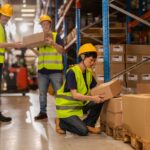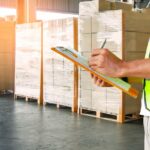With increasing pressure from consumers and regulators, companies can no longer ignore the ecological impact of their logistical choices. Packaging, often neglected, has become a major strategic issue. In particular, the issue of
Why is cardboard packaging seen as an environmentally-friendly solution?
Cardboard: a recyclable and biodegradable material
Cardboard, made from paper fibers, enjoys a positive image: it’s biodegradable, recyclable and derived from renewable resources. Unlike many plastics, it decomposes naturally in the environment without leaving toxic residues.
“Well-designed packaging isn’t just protection: it’s also a strong environmental message.” – The Iziship team
A greener life cycle than plastics
The manufacture of paperboard generally consumes less energy than that of plastics. Many production plants today use cleaner technologies, with renewable energy supplies and waste-limiting processes.
A high recycling rate in France
Around 80% of cardboard packaging is recycled in France, one of the highest rates in Europe. This
The environmental limits of cardboard: a false good idea?

Although often promoted as the “green” choice, cardboard is not without impact. Several factors need to be taken into account.
Water consumption in production
Producing cardboard requires a lot of water, especially to process the fibers and ensure the quality of the final material. This resource, though renewable, must be used with care. The most virtuous manufacturers today integrate industrial water recycling systems to minimize this impact.
Transport: a carbon footprint to consider
Even lightweight cardboard transport over long distances contributes to CO2 emissions. This is all the more true if the packaging is produced abroad or transported in large quantities without logistical optimization. Hence the importance of working with local suppliers.
Over-packaging: a common trap, even with cardboard
Using environmentally-friendly materials does not guarantee responsible packaging.
“Too much recycled cardboard is still a waste of resources, transport and money.” – The Iziship team
Reducing over-packaging: a priority for sustainable logistics

1. Opt for environmentally-friendly AND suitable materials
Choosing recycled cardboard, kraft paper or compostable materials helps reduce the impact of your shipments. But these materials must also be properly sized and resistant. Good ecological packaging combines performance and lightness.
2. Adapt the format to the product: no more oversized boxes
A box that’s too big means more unnecessary cushioning, more space taken up, and higher transport costs. By opting for modular packaging solutions, you can adjust the volume to suit each individual product, reducing both ecological and logistical costs.
3. Incorporate minimalist packaging techniques
The minimalist design reduces the number of layers and materials without sacrificing protection. This encourages simpler, more eco-conscious
4. Set up reuse processes
Encouraging the reuse of packaging is a winning strategy. Sturdy boxes can be returned, cleaned and put back into circulation. This requires reverse logistics, but the long-term savings are significant.
“Reducing over-packaging doesn’t mean sacrificing protection, it means rethinking packaging with intelligence.” – The Iziship team.
5. Train your teams in the right gestures
Well thought-out packaging starts with good execution. Training operators to optimize materials, avoid waste and use the right tools helps to anchor eco-responsible practices in daily routine.
6. Working with responsible logistics partners
Work with suppliers and transporters who make clear CSR commitments: choosing recycled materials, optimizing transport, reducing waste. This strengthens your credibility with your customers and partners.
Alternatives to cardboard overwrapping: should I still use it?
Cardboard, not always the best solution
Some very heavy products, or those requiring specific conservation, may call for other types of environmentally-friendly packaging solution: PLA, recycled plastic, reusable textiles, etc. The key is to choose the right material for the right purpose. The key is to choose the right material for the right purpose.
The return of reusables: a real way forward
Reusable rigid boxes, transport bins, multi-purpose pouches: reusable packaging is booming. It requires more organization, but can reduce packaging waste by up to 80%.
To find out more, consult Réseau Vrac’s zero waste guide, a reference resource on sustainable packaging.
Towards cleaner logistics with Iziship
Iziship offerscardboard packaging andlogistics optimization solutions designed to combine efficiency and sustainability. Thanks to our customized support, our team can help you :
- Reduce over-packaging without compromising protection
- Choose recycled, local and certified materials
- Set up reuse or recycling systems

In short: combining logistics efficiency and environmental awareness
Cardboard remains an excellent ecological packaging solution, provided it is used sparingly, intelligently and without excess. Over-packaging is as much a management issue as it is a sustainability issue: it calls for a rethinking of formats, processes and mentalities.
At Iziship, we believe that the future of logistics lies in rethinking, reasoning and responsible packaging.




